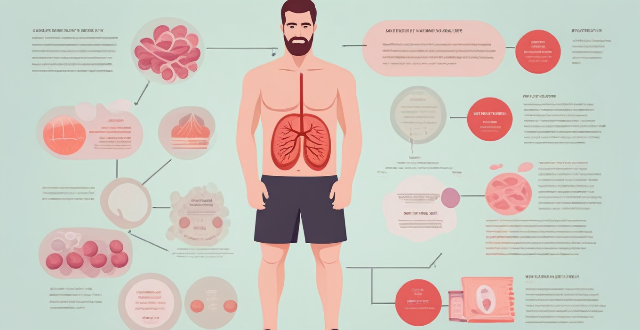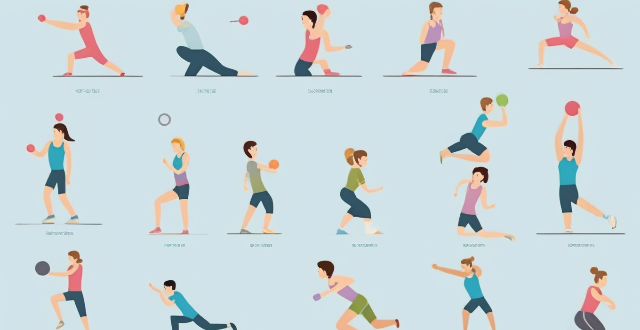Health Immune

Can exercise boost the immune system ?
Exercise can indeed boost the immune system through various mechanisms, including enhanced circulation, reduced inflammation, weight management, stress reduction, improved sleep, increased self-esteem and mental health, microbiome diversity, temperature regulation, prevention of chronic diseases, and social interaction. Regular moderate exercise is generally considered beneficial for the immune system, but it's essential to consult with healthcare professionals to determine the appropriate amount and intensity of exercise for individual needs and circumstances.

Is it true that certain superfoods can boost your immune system ?
Incorporating superfoods like citrus fruits, garlic, ginger, spinach, yogurt, nuts and seeds, blueberries, and turmeric into your diet can help support immune health by providing key nutrients such as vitamin C, vitamin D, zinc, protein, and antioxidants. These foods offer a range of benefits including boosting white blood cell production, reducing inflammation, supporting digestive health, and protecting against oxidative stress. However, it's important to maintain a balanced diet and lifestyle for overall immune support.

How does regular exercise contribute to boosting the immune system ?
Regular exercise has numerous health benefits, including boosting the immune system. It promotes increased blood circulation, reduces inflammation, helps in weight management, reduces stress, improves sleep quality, enhances gut health, increases antioxidant capacity, supports cardiovascular health, enhances mental health, and contributes to increased longevity. Incorporating regular physical activity into your lifestyle can support a strong and resilient immune system.

Is there a specific duration or intensity of exercise needed to improve immune function ?
The relationship between exercise and immune function is complex, but research suggests that regular physical activity can enhance the immune system. However, both the duration and intensity of exercise play significant roles in achieving this beneficial effect. The American Heart Association recommends at least 150 minutes of moderate-intensity aerobic activity or 75 minutes of vigorous-intensity activity per week for adults. Engaging in prolonged periods of endurance exercise can temporarily suppress immune function due to increased stress on the body. Light activities like walking or yoga can still offer immune benefits by reducing stress and promoting overall health. Regular moderate to high-intensity exercises, such as jogging, cycling, or strength training, are generally considered optimal for enhancing immune function. Adequate rest and recovery are crucial for maintaining a healthy immune system. Combining different types of exercises (aerobic, strength training, flexibility work) can provide a well-rounded approach to enhancing immune function. Staying hydrated and consuming a balanced diet rich in nutrients supports both exercise performance and immune health. Other lifestyle habits, including sleep quality, stress management, and avoidance of harmful substances, also play a vital role in supporting immune function alongside exercise.

Can excessive training have negative effects on the immune system ?
Excessive training, or overtraining, can have negative effects on the immune system. Regular exercise enhances immune function by stimulating antibody and white blood cell production, reducing inflammation, and improving circulation. However, excessive training can cause chronic inflammation, oxidative stress, and hormonal imbalances that suppress immune function. Signs of overtraining syndrome include chronic fatigue, mood changes, and increased susceptibility to illness. To prevent overtraining and maintain immune health, individuals should follow a balanced training program, prioritize sleep, eat a nutrient-rich diet, and manage stress levels.

How does consistent physical activity affect the immune system in relation to chronic disease prevention ?
The article discusses the impact of consistent physical activity on the immune system and its role in preventing chronic diseases. It explains that regular exercise can increase the number and activity of immune cells, reduce inflammation, and improve overall health. The article also provides recommendations for exercise and emphasizes the importance of incorporating physical activity into one's lifestyle to prevent chronic diseases and improve well-being.

How can I improve my diet to boost my immune system ?
Improving your diet is one of the best ways to boost your immune system. Here are some tips on how you can do that: ## Eat a Variety of Foods Eating a variety of foods ensures that you get all the essential nutrients your body needs. This includes fruits, vegetables, whole grains, lean proteins, and healthy fats. Aim for at least five servings of fruits and vegetables per day. ### Fruits and Vegetables - Apples - Bananas - Berries - Broccoli - Carrots - Spinach ### Whole Grains - Oats - Quinoa - Brown Rice ### Lean Proteins - Chicken breast - Fish (such as salmon or tuna) - Legumes (such as lentils or chickpeas) ### Healthy Fats - Avocados - Nuts (such as almonds or walnuts) - Seeds (such as chia or flaxseed) ## Stay Hydrated Drinking enough water is crucial for maintaining a healthy immune system. Aim for at least eight glasses of water per day, and more if you're active or it's hot outside. You can also stay hydrated by drinking herbal teas or eating water-rich foods like cucumbers, melons, and strawberries. ## Limit Processed Foods and Sugary Drinks Processed foods and sugary drinks can weaken your immune system by causing inflammation in your body. Try to limit these foods and drinks as much as possible, and opt for whole, nutrient-dense foods instead. ## Consider Taking Supplements If you're not getting enough vitamins and minerals from your diet, consider taking supplements. Some common supplements that may help boost your immune system include vitamin C, vitamin D, zinc, and probiotics. However, be sure to talk to your doctor before starting any new supplements.

What types of physical activities are most effective in enhancing immunity ?
Regular physical activity is crucial for enhancing immunity, with various types of exercises offering specific benefits. Aerobic exercises like jogging, cycling, and swimming improve cardiovascular health, respiratory function, and overall fitness, while also reducing stress and inflammation. Resistance training, including weightlifting and yoga, builds muscle mass, promotes hormone balance, and supports gut health. High-Intensity Interval Training (HIIT) boosts metabolism and cardiovascular health. Incorporating a mix of these activities into your routine can significantly enhance immunity.

How does hydration impact athletic performance and health ?
Hydration is crucial for athletic performance and health. Adequate hydration maintains energy levels, muscle function, joint lubrication, heart rate, and cognitive function during exercise. Dehydration can lead to fatigue, muscle cramping, increased heart rate, impaired cognitive abilities, and decreased physical performance. Proper hydration also aids digestion, kidney function, skin health, immune system function, and body temperature regulation. Chronic dehydration can increase the risk of kidney stones, digestive issues, weakened immune system, and other health problems. Therefore, it is essential for athletes to stay well-hydrated to achieve optimal performance levels and support their overall health.

How can stress management contribute to better personal health ?
Stress management is crucial for maintaining physical and mental health, as it can reduce the risk of chronic diseases, improve sleep quality, boost the immune system, reduce anxiety and depression symptoms, enhance cognitive function, and increase resilience. Incorporating stress management techniques into daily routines can lead to better overall well-being and a higher quality of life.

How does diet affect personal health ?
The article discusses the importance of a healthy diet in maintaining good health. It explains what constitutes a healthy diet and its benefits, such as reducing the risk of chronic diseases, improving mental health, managing weight, strengthening the immune system, and improving sleep quality. The article also provides tips for maintaining a healthy diet, including eating a variety of foods, limiting processed foods, watching portion sizes, being mindful of eating habits, getting enough sleep, and staying active.

What are the essential nutrients for women's health ?
Essential Nutrients for Women's Health Women's health requires attention to various aspects of nutrition, including essential nutrients such as calcium, iron, folic acid, vitamin D, omega-3 fatty acids, vitamin B12, fiber, vitamin C, zinc, magnesium, iodine, vitamin E, vitamin A, copper, choline, selenium, and potassium. These nutrients are crucial for maintaining good health, building and maintaining strong bones and teeth, making hemoglobin, preventing neural tube defects in developing babies, supporting bone and immune system health, supporting heart health and brain function, aiding digestion, helping form collagen in skin, important for immune system function, involved in more than 300 bodily processes, essential for thyroid function, acts as an antioxidant in the body, important for vision, helps the body form red blood cells, important for brain development and health, and acts as an antioxidant in the body. A balanced diet rich in these essential nutrients is crucial for women's health, and it's important to consult with a healthcare provider or a registered dietitian to ensure individual nutritional needs are met.

What role does sleep play in maintaining personal health ?
The text discusses the importance of sleep in maintaining personal health, including its roles in physical restoration and repair, energy conservation, weight management, memory consolidation, emotional regulation, cognitive function, stress reduction, mood stabilization, and relationship health. Adequate sleep is crucial for overall well-being, and prioritizing it can support physical, mental, and emotional health.

Are there any particular sports or exercises that have been studied for their impact on immunity ?
This article discusses the impact of various sports and exercises on immunity, including aerobic exercise, resistance training, high-intensity interval training (HIIT), and yoga/meditation. It highlights the positive effects of these activities on immune function when performed regularly and appropriately, such as increased blood flow, enhanced immune cell production, improved cardiovascular health, and reduced inflammation. However, it also emphasizes the potential negative effects of excessive exercise or overtraining on immunity, urging individuals to find a balance between physical activity and rest.

How does sleep quality affect athletic performance and health ?
This text explains how sleep quality affects athletic performance and overall health. It emphasizes the importance of sleep for physical recovery, mental well-being, and immune system support in athletes. Poor sleep quality can lead to decreased performance, increased injury risk, and mental health issues. The text provides tips for improving sleep quality, such as establishing a consistent sleep schedule and creating a comfortable sleep environment. Adequate sleep is crucial for optimal athletic performance and overall health.

How long after starting a new exercise routine can improvements in immunity be expected ?
Regular exercise has numerous health benefits, including improved cardiovascular health, weight management, and mental well-being. One of the lesser-known benefits is its positive impact on the immune system. Improvements in immunity can be observed within a few weeks of starting a regular exercise program, depending on individual factors such as current fitness level, intensity and duration of exercise sessions, and overall lifestyle habits. By incorporating regular physical activity into your daily routine, you can enhance your immune function and enjoy the numerous other health benefits associated with exercise.

Does consistent exercise reduce the risk of catching colds and flu ?
Regular physical activity is known for its health benefits, including potential protection against colds and flu. Studies suggest that exercise can enhance immune system function by improving circulation and inducing a mild inflammatory response. However, the evidence is mixed, with some studies showing a clear link between regular exercise and reduced respiratory infections, while others do not. Potential mechanisms include improved immune surveillance, stress reduction, and increased circulation of immune cells. To benefit from these effects, it is recommended to engage in moderate to high levels of physical activity, such as 150 minutes of moderate aerobic activity or 75 minutes of vigorous activity per week, along with strength training exercises. Overtraining should be avoided, as it can weaken the immune system. Good hygiene practices are also essential for preventing colds and flu.

What role does recovery play in a sports health management plan ?
Recovery is a crucial component of sports health management, enhancing performance, preventing injuries, promoting mental health, and maintaining a balanced lifestyle. It involves activities like sleep, nutrition, stress reduction techniques, and time management to ensure athletes can perform at their best while staying healthy and motivated.

How does regular exercise contribute to overall health management ?
This text discusses the importance of regular exercise for overall health management, highlighting its physical, mental, and emotional benefits. It emphasizes that exercise not only helps maintain physical health but also significantly contributes to mental and emotional well-being. The article lists various ways in which regular exercise contributes to overall health management, including improving cardiovascular fitness, aiding in weight management, enhancing muscle and bone health, boosting the immune system, preventing chronic diseases, reducing stress, improving mood, enhancing cognitive function, boosting self-esteem, providing opportunities for social interaction, and contributing to personal achievement. The text concludes by emphasizing that regular exercise is a crucial tool for managing overall health and that incorporating it into one's lifestyle is one of the best investments one can make for their health and well-being.

How does vaccine distribution affect public health ?
Vaccine distribution is crucial for global health, reducing disease incidence and healthcare costs while increasing productivity. Challenges include inequitable access, logistical complexities, and public perception issues.

How does regular exercise contribute to occupational health ?
**Summary: Regular Exercise in Occupational Health** The article discusses the role of regular exercise in promoting occupational health, which encompasses physical, mental, and social well-being. It outlines the benefits of regular physical activity, including improved stamina, reduced injury risk, enhanced immune system, stress reduction, better cognitive function, increased resilience, team building, and a healthy work-life balance. The text emphasizes that incorporating exercise into daily routines can significantly enhance job performance and overall employee well-being. Employers are encouraged to implement wellness programs with exercise initiatives to foster a healthier and more productive workforce.

Are there specific supplements recommended for women's health upkeep ?
The article provides a summary of the top supplements recommended for women's health, including Vitamin D, Calcium, Iron, Folic Acid, and Omega-3 Fatty Acids. These supplements support bone health, muscle function, immune function, cardiovascular health, cognitive function, and overall energy levels. The article emphasizes the importance of consulting with a healthcare provider before starting any new supplement regimen to ensure safety and effectiveness.

What are the long-term consequences of untreated mental health conditions in women ?
The text discusses the severe and long-lasting consequences of untreated mental health conditions in women, which can affect their overall well-being, relationships, and quality of life. These consequences can be physical, emotional, and social, and they often compound over time. The most significant long-term effects include increased risk of chronic diseases, compromised immune system, sleep disorders, escalation of symptoms, self-medication, suicidal thoughts and behaviors, strained interpersonal relationships, workplace challenges, financial difficulties, reduced life satisfaction, limited participation in activities, and poor self-esteem. It is essential to recognize that these conditions do not improve over time without intervention and instead worsen, causing a ripple effect that touches every aspect of a woman's life. Early detection and treatment are crucial for managing mental health disorders effectively and preventing these long-term consequences. Seeking support from professionals such as therapists, psychiatrists, or counselors can provide the necessary tools and resources to address mental health concerns and improve overall well-being.

How can a balanced diet contribute to women's health ?
A balanced diet is crucial for women's health, providing essential nutrients, supporting reproductive health, managing weight, preventing chronic diseases, enhancing mental well-being, promoting bone and digestive health, and improving skin and hair health. By incorporating a variety of food groups, women can ensure optimal physical and mental well-being across their lifespan.

What is the importance of mental health in overall personal well-being ?
The text discusses the importance of mental health in overall personal well-being. It explains how good mental health can lead to better physical health, emotional stability, healthy social relationships, workplace productivity, and an improved quality of life. The article emphasizes the need for prioritizing mental health by seeking professional help when needed, practicing self-care, and engaging in activities that promote good mental health.

What impact does participation in sports have on the mental health and well-being of marginalized groups ?
This article explores the impact of sports participation on mental health and well-being, particularly for marginalized groups. It highlights the physical health benefits such as improved cardiovascular health, weight management, and immune system strengthening. Mental health benefits include reduced stress and anxiety, increased self-esteem, improved sleep, and enhanced cognitive function. The article also emphasizes the importance of providing accessible sports opportunities and promoting inclusivity to reduce stigma surrounding mental health issues, build resilience, and foster strong communities among marginalized groups.

How does stress affect women's mental health ?
This text discusses the effects of stress on women's mental health, including anxiety and depression, sleep disturbances, emotional eating, low self-esteem, difficulty concentrating, irritability and mood swings, substance abuse, and physical health issues. It emphasizes the importance of self-care practices to manage stress effectively.

What are the benefits of regular exercise on personal health ?
Regular exercise is crucial for maintaining good health and preventing chronic diseases. It improves cardiovascular health, aids in weight management, increases muscle strength and endurance, enhances mental health, improves sleep quality, and reduces the risk of chronic diseases. Incorporating physical activity into your daily routine can significantly improve your overall quality of life.

How does work-life balance impact women's physical health and well-being ?
The article discusses the impact of work-life balance on women's physical health and well-being, highlighting the following key points: 1. **Stress and Mental Health**: Work-life imbalance can lead to chronic stress, weakening the immune system and increasing the risk of mental health issues like anxiety and depression, which in turn can cause physical health problems. 2. **Physical Health**: An unbalanced lifestyle often results in a sedentary lifestyle and poor eating habits, leading to weight gain, obesity, and an increased risk of chronic diseases. 3. **Reproductive Health**: Excessive stress and unhealthy lifestyle habits can affect women's reproductive health, causing menstrual irregularities, infertility, and complications during pregnancy. 4. **Quality of Life**: Work-life imbalance can significantly impact a woman's quality of life, leading to feelings of dissatisfaction, reduced productivity, and strained relationships. Maintaining a work-life balance is crucial for ensuring that women's physical health and overall well-being are not compromised.

How do climate losses and damages impact human health ?
This article discusses the impact of climate change on human health, highlighting various ways in which climate losses and damages can affect well-being. It covers topics such as extreme weather events causing physical injuries and illnesses, worsening air quality leading to respiratory problems, food insecurity resulting in malnutrition, increased waterborne diseases due to warmer water sources, and mental health issues arising from displacement and migration. The article emphasizes the need for a comprehensive approach to address these challenges, including mitigating greenhouse gas emissions, adapting to changing conditions, and providing support for vulnerable populations.